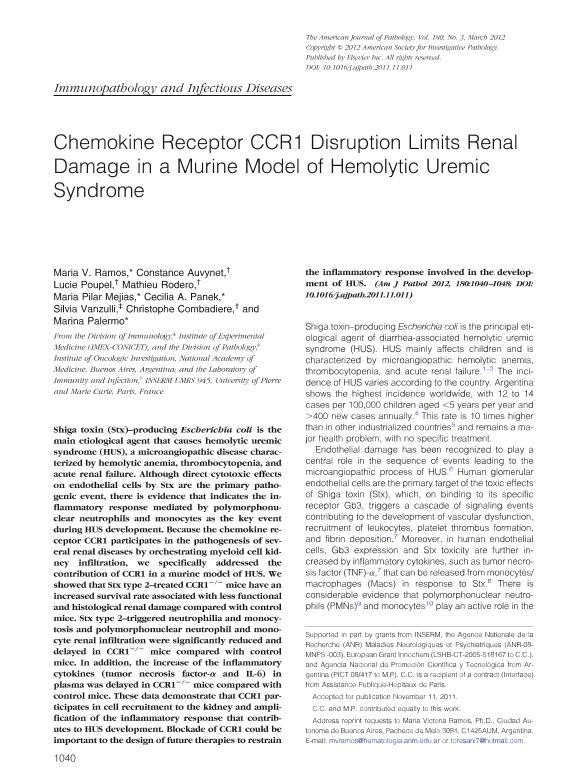Artículo
Chemokine receptor CCR1 disruption limits renal damage in a murine model of hemolytic uremic syndrome
Ramos, Maria Victoria ; Auvynet, Constance; Poupel, Lucie; Rodero, Mathieu; Mejias, María Pilar
; Auvynet, Constance; Poupel, Lucie; Rodero, Mathieu; Mejias, María Pilar ; Panek, Cecilia Analía
; Panek, Cecilia Analía ; Vanzulli, Silvia; Combadiere, Christophe; Palermo, Marina Sandra
; Vanzulli, Silvia; Combadiere, Christophe; Palermo, Marina Sandra
 ; Auvynet, Constance; Poupel, Lucie; Rodero, Mathieu; Mejias, María Pilar
; Auvynet, Constance; Poupel, Lucie; Rodero, Mathieu; Mejias, María Pilar ; Panek, Cecilia Analía
; Panek, Cecilia Analía ; Vanzulli, Silvia; Combadiere, Christophe; Palermo, Marina Sandra
; Vanzulli, Silvia; Combadiere, Christophe; Palermo, Marina Sandra
Fecha de publicación:
03/2012
Editorial:
American Society of Investigative Pathology
Revista:
American Journal Of Pathology
ISSN:
0002-9440
Idioma:
Inglés
Tipo de recurso:
Artículo publicado
Clasificación temática:
Resumen
Shiga toxin (Stx)producing Escherichia coli is the main etiological agent that causes hemolytic uremic syndrome (HUS), a microangiopathic disease characterized by hemolytic anemia, thrombocytopenia, and acute renal failure. Although direct cytotoxic effects on endothelial cells by Stx are the primary pathogenic event, there is evidence that indicates the inflammatory response mediated by polymorphonuclear neutrophils and monocytes as the key event during HUS development. Because the chemokine receptor CCR1 participates in the pathogenesis of several renal diseases by orchestrating myeloid cell kidney infiltration, we specifically addressed the contribution of CCR1 in a murine model of HUS. We showed that Stx type 2treated CCR1 -/- mice have an increased survival rate associated with less functional and histological renal damage compared with control mice. Stx type 2triggered neutrophilia and monocytosis and polymorphonuclear neutrophil and monocyte renal infiltration were significantly reduced and delayed in CCR1 -/- mice compared with control mice. In addition, the increase of the inflammatory cytokines (tumor necrosis factor-α and IL-6) in plasma was delayed in CCR1 -/- mice compared with control mice. These data demonstrate that CCR1 participates in cell recruitment to the kidney and amplification of the inflammatory response that contributes to HUS development. Blockade of CCR1 could be important to the design of future therapies to restrain the inflammatory response involved in the development of HUS.
Palabras clave:
Hus
,
Shiga Toxin
,
Chemokines
,
Ccr1
Archivos asociados
Licencia
Identificadores
Colecciones
Articulos(IMEX)
Articulos de INST.DE MEDICINA EXPERIMENTAL
Articulos de INST.DE MEDICINA EXPERIMENTAL
Citación
Ramos, Maria Victoria; Auvynet, Constance; Poupel, Lucie; Rodero, Mathieu; Mejias, María Pilar; et al.; Chemokine receptor CCR1 disruption limits renal damage in a murine model of hemolytic uremic syndrome; American Society of Investigative Pathology; American Journal Of Pathology; 180; 3; 3-2012; 1040-1048
Compartir
Altmétricas



